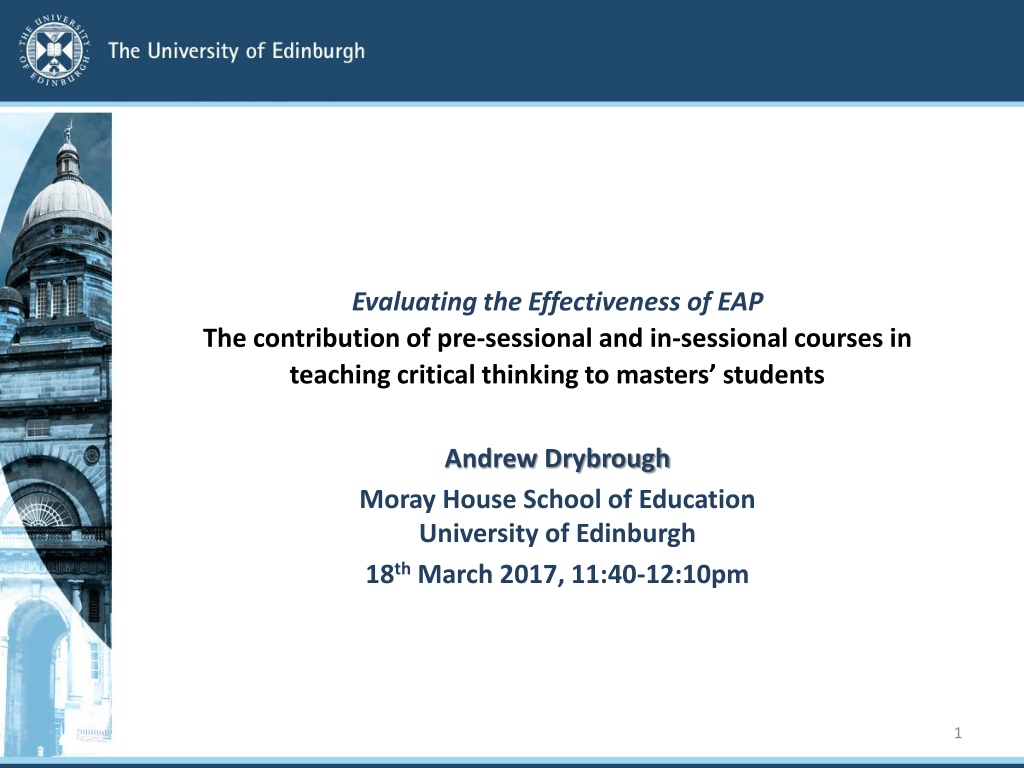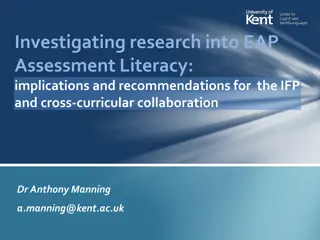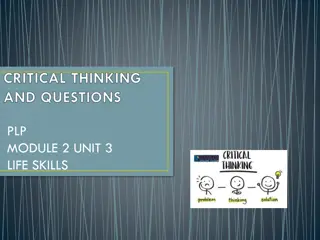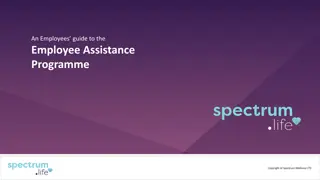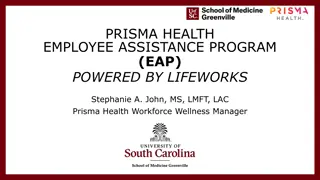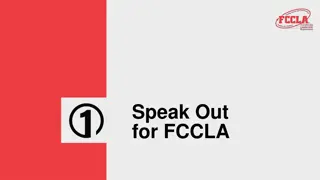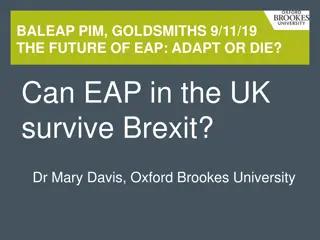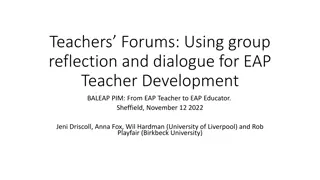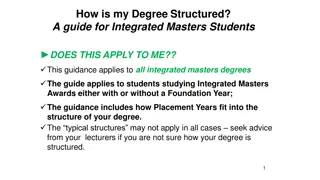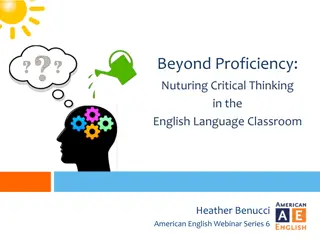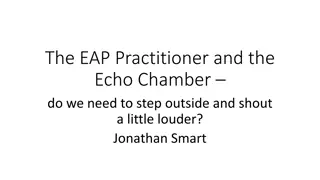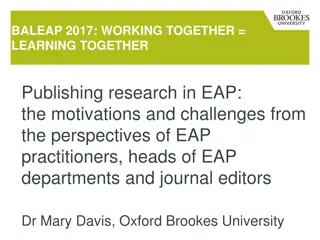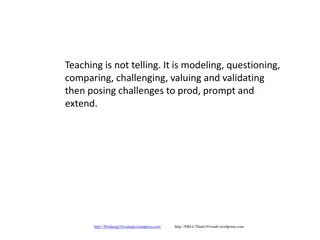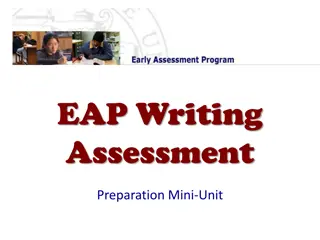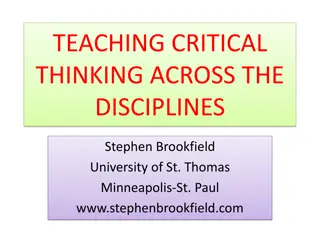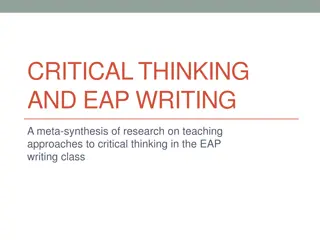Effectiveness of EAP in Teaching Critical Thinking to Masters Students
This presentation by Andrew Drybrough evaluates the contribution of pre-sessional and in-sessional courses in teaching critical thinking to masters students. It discusses the importance of critical thinking skills in EAP, examines the responsibilities of various stakeholders, addresses the audience for EAP courses, and outlines specific pre-sessional and in-sessional courses offered. The research methodology and findings related to critical thinking and academic writing among master's students are also highlighted.
Download Presentation

Please find below an Image/Link to download the presentation.
The content on the website is provided AS IS for your information and personal use only. It may not be sold, licensed, or shared on other websites without obtaining consent from the author. Download presentation by click this link. If you encounter any issues during the download, it is possible that the publisher has removed the file from their server.
E N D
Presentation Transcript
Evaluating the Effectiveness of EAP The contribution of pre-sessional and in-sessional courses in teaching critical thinking to masters students Andrew Drybrough Moray House School of Education University of Edinburgh 18thMarch 2017, 11:40-12:10pm 1
Outline 1 - Critical thinking and EAP 2 My research into critical thinking and academic writing 3 Main findings 2
1.1 - Critical thinking skills and EAP BALEAP Competency Framework (2008, p.3) tasks, processes and interactions that require students to demonstrate critical thinking skills SCQF (2012, p.27) Level 11: critical understanding , critical analysis, evaluation and synthesis QCF (2008, p.50) Level 7: Critically analyse, interpret and evaluate concepts and theories Barnett (1997, p.7): Critical thinking is a defining feature of higher education. 3
1.2 - Whose responsibility? UG or previous educators (?) Gate keeping exams (?) (e.g. IELTS) Individual student responsibility (?) Pre-sessional EAP courses (?) In-sessional EAP courses (?) PGT content courses (?) Other PGT courses (e.g. Research Methods, CT) (?) 4
1.3 - EAP courses for whom? EU and non-EU account for about 69% of FT PGT in 2015/16 in the UK 127,000 FT PGT sts in 2015/16 in the UK (HESA, 2017) But International students include NS and NNS All have to adapt to small culture of PGT academia (Holliday, 1999) 5
1.4 Pre-sessional and in-sessionals Pre-sessional (4 wk final ESAP block) + 6 wks EGAP blocks (UoE) Education (ELTAL): 2015 (80) 2016 (80) Business (EBM): 2015 (48) 2016 (68) Total EAP: 2015 (510), 2016 (552) In-sessional (MHSE) Academic Essay Writing for Education Masters Students (120) Dissertation writing for Education Masters Students (120) Others: online material and School specific courses 6
2.1 My research into critical thinking and academic writing Conceptualisation of critical thinking and academic writing among master s students 7 PGT sts in two focus groups (pre-sessional EAP) 6 PGT sts interviewed (did pre/in-sessional EAP courses) 7
2.2 Focus group participants (Oct. 2015) Pseudonym (code) Masters Nationality Gender Jess (S1f) TESOL Chinese F Carol (S2f) TESOL Chinese F Jean (S3f) TESOL Chinese F Tess (S4f) TESOL Chinese F Judy (S5f) TESOL Chinese F Lin (S6f) TESOL Chinese F June (S7f) TESOL Chinese F 8
2.3 Interviewees (Jul. 2016) Pseudonym (code) Masters Nationality Gender Yumi (S3) TESOL Japanese F Henry (S5) Language Teaching Chinese M Cheryl (S6) Education Chinese F Nicky (S7) Education Chinese F Marco (S12) Strength and Conditioning Italian M Zara (S13) Management Chinese F 9
2.4 - Method of analysis and coding 1 - Structural coding a content-based or conceptual phrase representing a topic of inquiry that relates to a specific research question to frame the interview (Salda a, 2009, p. 66) 2 Magnitude coding (Miles and Huberman, 1994) Adding an additional alphabetical and/or numeric code or sub- code to existing coded data 3 - In Vivo (literal or Verbatim coding) (Charmaz, 2006; Corbin and Strauss, 2008) Words or short phrases from actual language used that respect the participants voice. 10
3.1 Main findings: focus groups Where does your knowledge of CT come from? 1 Pre-sessional EAP courses a) Students perceived it was a stated aim to teach CT b) Taught them to read critically c) Taught them to write critically d) Taught them to do critical presentations e) Overall positive impression of EAP courses f) But it s only a start 11
a), b), c) Pre-sessional (reading and) writing a) when we take pre-sessional English, one of the aim is to teach us about critical thinking (S4f) b) and especially the reading class (S4f) c) and the writing class (S4f) How to write critical review is very useful for critical thinking (S4f) the first one is the part of the pre-sessional EAP course the writing assignment ask us to write a critical review of a journal article, so I think that s a very important one (S5f) 12
d), e) Pre-sessional (presentations and) overall d) as for the presentation when we do the presentation preparation we also evaluate them, one thing positive points and negative points (S5f) e) I think we have some kind of ideas in our mind that is critical thinking, but we are not very clear about that, but when we came here the ideas seem more clear because of we take the course and everything / every terminology is very clear to us. So this thing, critical thinking, seems to be more logical in our mind, and we can use it properly. (S1f) Well, I think, actually pre-sessional course does help us to critically think (S7f) 13
f) But its only a start f) Even though I took the pre-sessional, I still think critical thinking is very difficult because we have so much reading and it s very difficult for us to finish reading, so maybe we don t have so much time to think it critically [laughter] (S4f) I think attending the pre-sessional course does have a lot for us, but reading extensively is also critical / very crucial reason to be critical thinking as well. (S5f) but I think others who do not take the pre-sessional course will also learn the critical thinking [yes] the only difference is the speed. Yeah, if I take the pre-sessional course maybe I can / it will be easier for me to handle this. It will hard for them / well but actually the end is the same. We can all learn how to critical thinking [yeah] (S7f) 14
Other notable points In-sessional writing course also gave tips Tutors in the pre-sessional and masters encouraged and modelled how they could be critical Being critical is part of living in the UK Workshops (seminars) in the PGT masters were a forum where this was particularly encouraged 15
3.2 Main findings: interviewees 1 Pre-sessional EAP a) Positive comments b) Success may depend on teaching 2 In-sessional EAP a) Positive aspects b) Limitations 3 Embedded support as part of the PGT 16
1 a) Pre-sessional EAP: positive comments What I have learned about critical thinking is all on the pre- sessional course. (S13) But I think a pre-sessional course is quite useful the pre- sessional course is almost for English writing and English skills improvement so they always highlight we need to have a critical thinking skills (S7) I feel like the reason that pre-sessional course is really helpful is because we have like homework, like exercise every day to help us practice (S6) 17
1 b) Success may depend on teaching 1 but I did the pre-sessional course, and [the tutor] she helped a lot but it s not enough (S6) what teachers told us is very important cos in block 1, the tutor will give us some tips of critical writing, and how to write your academic writing. What is academic writing, what is academic vocabulary. What kind of vocabulary you use is not suitable for your further academic writing. (S13) 18
1 b) Success may depend on teaching 2 It actually is, but still needs to depend on the tutor, how they teach it. (S7) but I think it really depends on how the teacher Yes and, and that s what I want to say since a lot of my friends also did pre-sessional course, same as me but they didn t got the same tutor as me, so even up to now some of my friends still told me they don t know what is critical thinking, so I think it really depend on the tutor. (S7) 19
2 a) positive aspects of in-sessional EAP I don t know exactly the way to construct argument for critical thinking cos I didn t take any courses for writing about it but writing course provided by a language assistance at the University helped me a lot for the/the structure. So I think I improved a lot. (S3) I think that a separate course can be really helpful, especially because it helps you to practice more, more and more, but someone like telling you this is the way you do, because it s also like a systematic way of critical thinking about something (S12) 20
2 b) Limitations of in-sessional EAP we already pretty stressful so we don t really, really have time to practice but I don t think like everyone doing their masters have time to do that [in-sessional course] . (S6) So just really, really like someone push you in the right direction, and then it s all about you. And then it's all a lot about practising. (S12) 21
3 Embedded support as part of the PGT this one I will hold it maybe at the very beginning of each semester and each of the course - yeah - and since maybe I just what like I talk about, maybe different course has different requirements about a critical thinking, so I think that s the reason why the teacher need to demonstrate what they really want us to critical about during course (S7) Yeah at the end of/at the start of his lesson of his own chapter, he decided to do a critical thinking lesson and was like a one-hour session (S12) 22
Caveats and summary Small group of respondents Generally started with difficulties Ended with clearer conceptualisation Pre- and in-sessional EAP courses important Foregrounded importance of tutor Implicitly stressed their own effort Nothing on the writing product Assessment criteria washback can be incentive 23
Pedagogical implications CT should be explicitly embedded generically in pre-sessional/in-sessional EAP courses Content courses should have explicit tuition on what CT means in their discipline Both could be connected to assessment criteria and frameworks 24
Conclusion Pre- and in-sessional EAPs can develop CT Responsibility of tutor vs. the curriculum (?) Content course tutors also have responsibility Assessment criteria of EAP and content courses can affect this Students need to continue to apply CT (R/W) 25
References Barnett, R., 1997. Higher Education: A critical business. Buckingham: Open University Press. British Association of Lecturers in English for Academic Purposes, 2008. Competency Framework for Teachers of English for Academic Purposes, BALEAP. Charmaz, K. 2006. Constructing Grounded Theory: A practical guide through qualitative analysis. Thousand Oaks, CA: Sage https://www.hesa.ac.uk/data-and-analysis/publications/students-2015-16 Table C [Accessed 13 March 2017] Holliday, A. 1999. Small Cultures. Applied Linguistics. 20 (2) pp.237-264. Miles, M. B, and Huberman, A. M. 1994. Qualitative data analysis. (2nd ed. ) Thousand Oaks, CA: Sage. Qualification and Credit Framework, 2008. Regulatory Arrangement for the Qualification and Credit Framework [pdf] Available at: <https://www.gov.uk/government/uploads/system/uploads/attachment_data/file/371294/2008-08-15- regulatory-arrangements-qcf-august08.pdf> [Accessed 30 November 2016] Scottish Credit and Qualification Framework, 2012. SCQF Level Descriptors [pdf] Available at: <http://scqf.org.uk/wp-content/uploads/2014/03/SCQF-Revised-Level-Descriptors-Aug-2012-FINAL-web- version1.pdf> [Accessed 30 November 2016] Salda a, J. 2009. The Coding Manual for Qualitative Researchers. Thousand Oaks, CA: Sage. 26
Thank you Any comments of questions? 27
